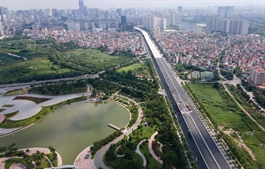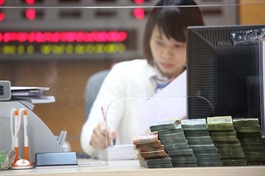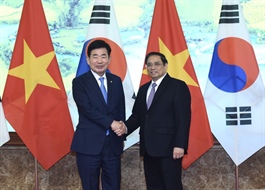Potential through the roof for bilateral advancement in UK-Vietnam linkages
Potential through the roof for bilateral advancement in UK-Vietnam linkages
The United Kingdom and Vietnam’s relations are at an all-time high, and in that context, we are delighted to be celebrating five decades of diplomatic relations this year. The UK-Vietnam Strategic Partnership, refreshed in 2020 shortly after I arrived in the post, set the tone for an ever-closer political and economic relationship.
This was swiftly followed by the implementation of the UK-Vietnam Free Trade Agreement (FTA) in 2021, a hugely significant milestone for our bilateral trading partnership, and by the UK becoming an ASEAN dialogue partner later that same year.
I have been delighted to see how this strong foundation is enabling us to work closely together to tackle some of the world’s greatest challenges, from supporting one another throughout the pandemic to increasingly partnering in our shared efforts to address climate change.
The 50th anniversary of diplomatic relations is a chance to celebrate our relationship's strength and look ahead to the next 50 years, during which we hope to see Vietnam meet its ambitious development goals, achieve net-zero by 2050, and to achieve high-income status.
The prospects for continued and deepened strategic cooperation between Vietnam and the UK are strong, and our forward-looking relationship will only grow in importance.
Our focus this year will be on how the UK and Vietnam collaborate to build for the future, with a particular emphasis on key themes such as trade, sustainability, and education. These are critical elements in connecting the economies of our two countries and strengthening bilateral strategic cooperation.
Despite post-pandemic challenges and global volatility, we are trading with each other more than ever. Total trade in goods and services between the UK and Vietnam now stands at $7.09 billion, an increase of over 12 per cent over the same period last year.
This strong trade relationship is supported by both sides’ efforts to facilitate trade and remove market access barriers through the annual UK-Vietnam Joint Economic Trade Committee and our bilateral FTA.
The FTA represents a significant step forward in our two nations’ economic and trade ties. It removes 99 per cent of tariffs by full implementation, but the benefits are much broader than that. Both sides can use the FTA and its provisions to advance business interests and remove barriers to market access.
After two years of our FTA, Vietnamese businesses can access preferential tariff rates across a whole range of sectors, including footwear, textiles, and agricultural products that have seen particularly high export growth rates. And British businesses are benefiting too, including in some of our most important export categories. For example, British exports in medicinal and pharmaceutical products have enjoyed robust growth, growing at over 40 per cent on-year in the first nine months of 2022. Under the FTA, UK pharma companies can benefit from significantly lower tariffs, but the benefits are much broader than that.
The FTA allows for increased access to the public procurement market for pharmaceutical products, as well as increased protection and enforcement of intellectual property rights, especially of pharmaceutical patents, and it helped to deliver regulatory changes that allow British pharmaceutical companies to obtain a foreign-invested enterprise status in the Vietnamese market.
There remains huge potential for our bilateral trade relationship to grow as we enter the third year of FTA implementation. We are focused on further boosting bilateral trade, benefiting both countries' businesses and consumers.
As well as continuing to implement our bilateral FTA and to use its many levers to identify and also remove sectoral trade barriers, we are also very much focused on promoting trade in key sectors of opportunity such as clean growth, health, education, financial and professional services, and technology.
Throughout the year, we will maintain a consistent programme of trade promotion and business engagement activities in these key sectors, including a series of trade shows and trade missions bringing UK businesses to Vietnam, to invest for the future.
We are also aware of Ho Chi Minh City’s ambition to become a regional financial and business centre and an economic and investment hub. We will launch a project with the city to help it achieve its goals.
Finally, and importantly, we remain committed to the UK joining the Comprehensive and Progressive Agreement for Trans-Pacific Partnership (CPTPP), which is one of the largest free trade areas in the world. This will complement our bilateral FTA and further bolster our trade with Vietnam.
Foreign investors, including those from the UK, are becoming increasingly sensitive to environmental and climate concerns. I am pleased to see Vietnam beginning to lead the way in the region on sustainability. This will continue to be a key pillar of the UK and Vietnam’s relationship, and I believe it will be key to unlocking further trade and investment.
In December, international partners successfully agreed to the Just Energy Transition Partnership, which will mobilise $15.5 billion in international technical and financial assistance to accelerate Vietnam's transition from coal to renewable energy.
Investing now in clean infrastructure and high-tech climate solutions will be vital for Vietnam to maintain its attractiveness to investors and sustain its economic growth in the coming decades, and the business community also has an important role to play in enabling this.
This will not only allow Vietnamese products to enter markets with high environmental and quality standards, such as the UK, but will also attract more UK investors to Vietnam.
At this exciting moment for UK-Vietnam relations, and as we celebrate 50 years of diplomatic relations and continue to work together to build for the future, I would like to offer my best wishes to all for a happy and prosperous Year of the Cat.
























